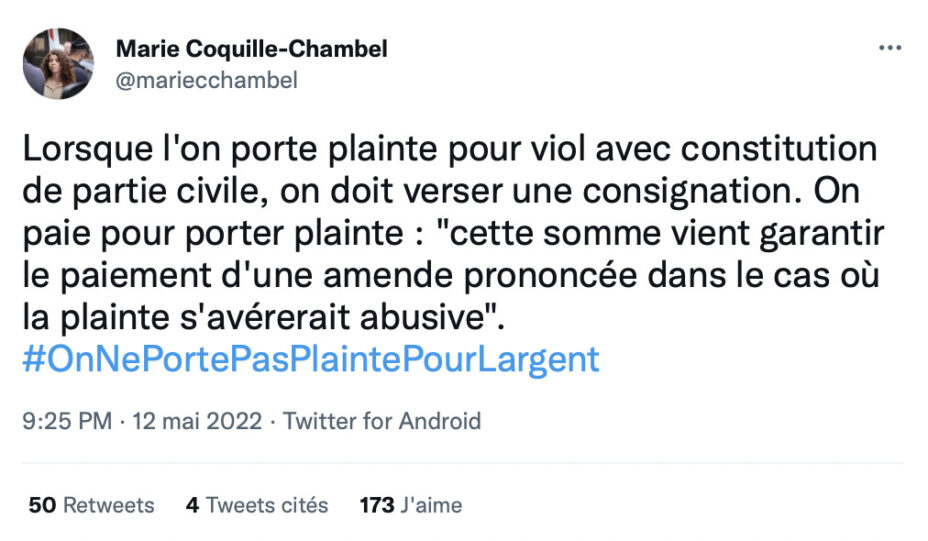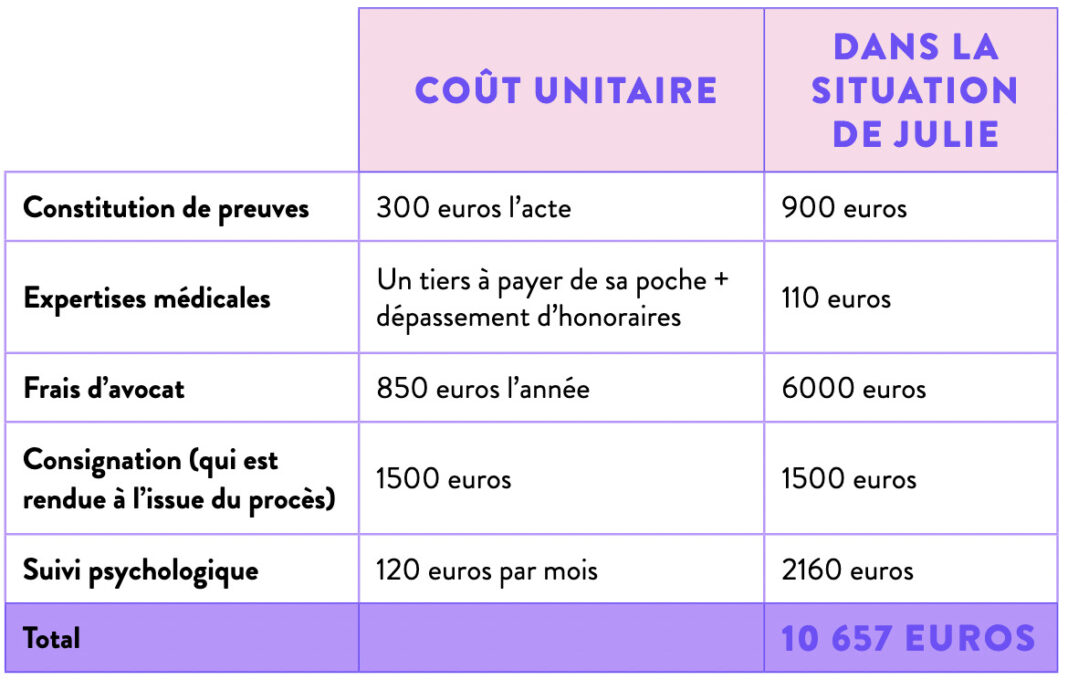Estimating the cost deriving from legal expenses in the event of rape, sexual violence or sexual harassment, this is the objective of the report published by the Women’s Foundation for this November 25, the day for the fight against gender-based and sexual violence.
The report, written by Lucile Peytavin, author of the Cost of manhoodand Lucile Quillet, author of Price to payopenly echoes the mobilization of activist and actress Marie Coquille-Chambel #OnNePortePasReclameForMoney to witness the financial investment that victims of gender-based and sexual violence must make. Because, as the report points out, “seeking justice is not free”.
The image of filing a complaint like that of a Via Crucis is therefore far from exaggerated. The authors of the report also mention a “triple penalty” : the victims “subject to violence, the economic cost of justice and the more intangible cost of trauma that adds up on multiple scales.”

Since an example speaks louder than a lengthy explanation, the report is based on a simulation with a very concrete case of a victim:
“Julie is single, lives in Paris, earns 1450 euros net per month. She is a victim of rape. He pays for three documents with a bailiff (text messages, emails, eyewitnesses), has two urgent medical tests carried out: one with a doctor who charges 50 euros per visit (he pays 35 euros out of his own pocket), one with the gynecologist who charges 90 euro per consultation (she pays 75 euro out of her own pocket).
File a complaint, file a civil action, bring a lawyer out of AJ (legal aid) to ensure a good defense. She is followed up by a psychologist at the rate of two sessions a month for a year and a half. The procedure lasts 7 years. As in the vast majority of cases, her attacker is not convicted. Tired and exhausted, she did not ask for compensation from the FGTI. »
The result looks crazy: the cost of the procedures of Juliawhich contains in particular the collection of evidence (text messages, emails, but also medical visits), or the payment of the shipment (“calculated based on the victim’s income”), amounts to more than 10,000 euros.

What state aid? How to measure the damage?
Full or partial legal assistance (which is not subject to conditions in case of rape) is a payment of legal fees by the state. However, the report highlights one important aspect of this aid: “it is more important for the alleged perpetrators than for the victims”.
Additionally, defending an attacker is often more financially beneficial to lawyers:
“In general, it is more profitable – legal aid or not – to defend the perpetrators of crimes or sexual offences: since in 99% of cases they are men, they benefit from better financial resources. Therefore, the reservoir of lawyers ready to defend women victims of sexual violence is much more limited than that of the perpetrators of this same violence. »
The report also raises the question of financial compensation for victims, a complex issue that the question of how we measure the damage of this violence :
“How to translate the damages suffered as a result of rapes, sexual assaults and harassment into money? If we talk about “reparation” or “compensation” amount, it goes without saying that an economic sum cannot cancel the trauma suffered. A victim does not “repair” itself. Money gives recognition and, above all, allows the victim to rebuild himself. »
A victim has three years to apply to the Commission for the Compensation of Victims of Counterfeiting (CIVI) apply. Once declared eligible, she will receive compensation through the Guarantee Fund for Victims of Terrorism and Other Crimes (FGTI).
Victims too often abused
“In addition to undergoing a costly legal process, victims often face a form of collective abuse in their search for justice, from law enforcement, lawyers and psycho-medical personnel who too often ignore the specific mechanisms of sexual violence ”finally remember the relationship.
The Women’s Foundation insists on the plurality of this cost of justice, beyond the purely financial aspect, in particular through psychological consequences, on social life, on work. The feminist organization ends its relationship with several recommendations including the reassessment of the extent of legal aid, the guarantee of psychological monitoring or even better information on the FGTI.
Photo credit: Maëlle Le Corre for Madmoizelle
Source: Madmoizelle
Elizabeth Cabrera is an author and journalist who writes for The Fashion Vibes. With a talent for staying up-to-date on the latest news and trends, Elizabeth is dedicated to delivering informative and engaging articles that keep readers informed on the latest developments.




